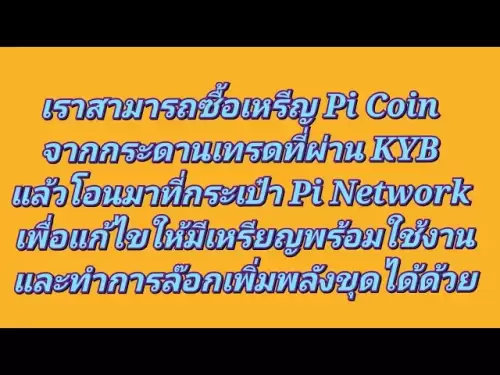 |
|
 |
|
 |
|
 |
|
 |
|
 |
|
 |
|
 |
|
 |
|
 |
|
 |
|
 |
|
 |
|
 |
|
 |
|
Cryptocurrency News Articles
Casper Network Launches Its Highly Anticipated Casper 2.0 Update
May 05, 2025 at 07:11 pm

After comprehensive development and testing, Casper Network has announced the Casper 2.0 update’s Mainnet launch on May 6. The upgrade completed stability checks on Testnet to ensure top performance. This rollout marks a major technical evolution in the Casper ecosystem. It aims to boost efficiency, reduce resource dependence, and introduce new, developer-friendly tools.
Beyond minor optimizations, the protocol now features structural enhancements. These improvements touch consensus mechanisms, smart contract functions, and transaction handling processes. Together, they shift network architecture.
One of the core upgrades in this release is the Zug Consensus Protocol, which is replacing the older Highway protocol. Zug enables leaner, more efficient consensus-building across the network. It uses skippable rounds so failures do not stall the entire system. During partitions or high latency, this design maintains cohesion and resilience. Leaders propose blocks while validators echo signed messages to preserve integrity. By reducing computational overhead, Zug upholds the security model central to Casper. This change also enhances network performance under varied conditions.
New Native Event System Simplifies Developer Workflows
Casper 2.0 update introduces native contract-level event emission, reducing dependence on third-party libraries. Developers no longer need external tools like the Casper Event Standard for event handling. Instead, built-in mechanisms push events directly to on-chain and off-chain systems. Subscribers can consume these messages via the event stream and verify them using the proof methods included.
This integrated solution streamlines communication between smart contracts and external applications. The CEP-88 implementation serves as a secure template for efficient cross-system messaging. Overall, this upgrade elevates the developer experience and ecosystem interoperability.
The Casper 2.0 update also delivers the Virtual Machine 2.0 architecture with multi-VM targeting capabilities. Transactions can now specify the execution environment of their choice. This flexibility supports backward compatibility and ensures long-term network scalability. FFI enhancements grant access to additional hashing algorithms and block metadata. These improvements assist in creating more secure, unpredictable outputs for smart contracts, leveraging random values.
Together, these changes position the network for future growth and flexibility. Developers gain more control over execution contexts and richer functionality for complex contract logic.
Streamlining Smart Contracts with New Transaction Framework
Another key improvement is the new Transaction model, which replaces the legacy Deploy model. This change offers more efficient access to global state data. Wasm-less interactions become faster and consume fewer resources. Although backward compatibility handles most Deploys, deprecated data types may fail. This model simplifies developer workflows and encourages scalable, maintainable smart contract designs. Teams can adopt modern architectures without sacrificing performance. Over time, this approach should promote broader ecosystem adoption and reduce technical debt for long-term projects. Developers will appreciate the streamlined process across diverse project types.
From a systems perspective, this release also introduces the Casper Sidecar service outside the core node software. Decoupling RPC enables better debugging and independent updates. This modular approach simplifies architecture management for complex deployments. API enhancements further expand network interaction capabilities. Developers can integrate custom applications with greater ease. These upgrades are crucial for teams building sophisticated on-chain solutions. Overall, the system-level changes provide scalability, maintainability, and flexibility for large-scale projects on the Casper Network. It supports independent upgrades for future enhancements.
Unified Address System and Fee Overhaul in Casper’s Focus
Experimental features include account and contract unification under a single AddressableEntity type. This design promises simplified address management and improved user experience. Additionally, the temporary hold system replaces traditional gas fees. These experiments hint at major shifts in transaction and entity handling models. A new burn function for the CSPR token, defined in CEP-92, allows permanent token removal from circulation. Token holders gain enhanced utility and governance options.
As the May 6 Casper 2.0 update nears, participants should review documentation and deprecation notices carefully.
Disclaimer:info@kdj.com
The information provided is not trading advice. kdj.com does not assume any responsibility for any investments made based on the information provided in this article. Cryptocurrencies are highly volatile and it is highly recommended that you invest with caution after thorough research!
If you believe that the content used on this website infringes your copyright, please contact us immediately (info@kdj.com) and we will delete it promptly.
-

-

-

- Iris-scanning project World promises to distinguish humans from AI bots
- Jun 09, 2025 at 03:35 pm
- The core premise behind World is to create a secure, verifiable way to distinguish humans from AI bots, as artificial intelligence continues to blur the lines between real and synthetic online interaction.
-

-

-

-

-

-

- Pepeto Emerges as the Next Memecoin Contender, Blending Viral Appeal with Real Utility and a Presale Price Too Low to Ignore
- Jun 09, 2025 at 03:20 pm
- As altcoin season heats up and Pepe's momentum cools, Pepeto emerges as the next memecoin contender, blending viral appeal with real utility and a presale price too low to ignore.






























































